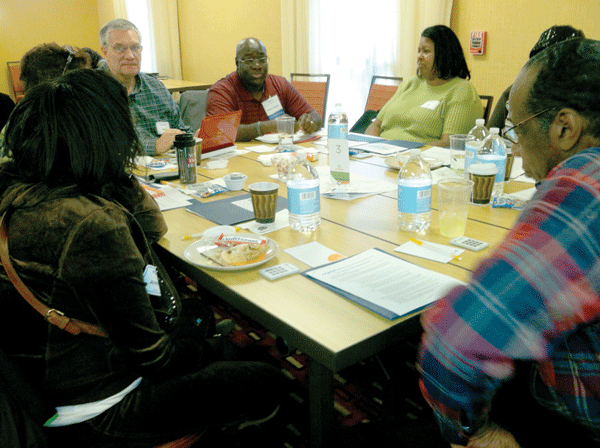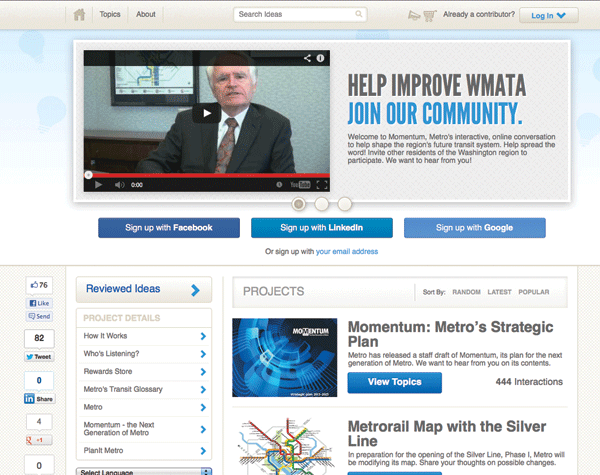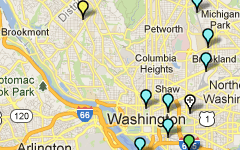Stakeholder Outreach Response
Momentum employed a multi-pronged outreach  and feedback gathering strategy, including both conventional and modern tools. Metro staff gathered input to inform a draft plan and subsequently, gathered feedback on the plan prior to finalizing it. Metro staff heard from almost 12,000 stakeholders during the outreach process through the following tools. The input has informed Metro’s understanding of the public’s short- and long-term needs.
and feedback gathering strategy, including both conventional and modern tools. Metro staff gathered input to inform a draft plan and subsequently, gathered feedback on the plan prior to finalizing it. Metro staff heard from almost 12,000 stakeholders during the outreach process through the following tools. The input has informed Metro’s understanding of the public’s short- and long-term needs.
Momentum Forums
Four deliberative forums, one in each jurisdiction and one in Spanish, were conducted in the fall of 2012. The special format allowed participants to learn more about Metro issues, discuss them in groups, and vote on or prioritize issues. Approximately 120 people, recruited and screened to be a representative sample of Metro ridership, participated in these forums.
MindMixer
Since September 2012, the site has been visited over 12,000 times, by 7,700 unique individuals. Four rounds of questions were posted, generating comments ranging from many short-term suggestions such as platform markings, running more trains and more buses in the off-peak hours, and improving service information in the stops and stations, to long-term solutions such as separating the Blue/Orange/Silver lines, adding bus-only lanes, and second entrances and mezzanines at all major stations.
Momentum Rider Surveys
On December 3, 2012, an online survey was sent to a random selection of 5,000 bus and rail riders to gather information from those who did not have a chance to participate in other Momentum outreach efforts. In addition, on December 12th, Metro opened the survey to the public, which resulted in over 3,000 responses, most of which came from frequent riders. Metro also conducted a survey at various regional bus stops.
Washington Post Forum
On December 14, 2012, the Washington Post, in conjunction with Metro, hosted an on-the-record Forum. Approximately 150 civic and business leaders and public officials attended. The content, however, reached many more people with an online viewing audience of 1,200 (double that of a typical forum), Tweets of 3.6 million impressions, and web page views of 10,000. The Post Forum focused on the challenges of commuting in the region, as well as possible priorities, approaches and solutions.
WMATA Homepage
The Board’s strategic plan framework has been posted on line since September 27, 2012 for public review of the newly adopted vision, mission and goals. The website has offered a video of Momentum and a landing page with stakeholder information about the plan and outreach effort. Since Metro launched the Momentum outreach effort and staff draft of the plan, these webpages have nearly 6,000 unique page views. Frequent tweets and Facebook posts have been received by Metro’s 37,000 Twitter followers and nearly 4,000 Facebook friends.
Stakeholder Presentations
Over 60 presentations were made throughout the region to:
Business Groups, including:
- The Washington, D.C. Chamber of Commerce
- Fairfax Economic Development Authority
- Montgomery County Chamber of Commerce
- Washington, D.C. Board of Trade
- District of Columbia Business Improvement District (BID) Council
- D.C. Building Industry Association
Public Officials, including:
- Maryland Congressional Delegation
- Montgomery County, Arlington County, Prince George’s County
- Northern Virginia Transportation Commission
- Virginia Department of Rail and Public Transportation
- D.C. Council
Planning organizations such as:
- Transportation Planning Board (TPB);
- National Capital Planning Commission
- D.C. and Prince George’s Planning Departments
- Region Forward Coalition
Advocacy groups, such as:
- Urban Land Institute (ULI)
- Coalition for Smarter Growth
- D.C. Federation of Citizens Association
- American Planning Association – DC Chapter
- American Institute of Architects – DC Chapter
Metro’s Accessibility Advisory Committee, Riders’ Advisory Council, and Jurisdictional Coordinating Committee were also briefed and consulted.
Metro also hosted three public meetings about Momentum and the FY2014 budget. Three employee town hall meetings were also convened with updates distributed to employees through the GM’s weekly messages. Internally, five employee Momentum roundtable discussions have been held with leadership of multiple departments.
Other Outreach Tools
To encourage widespread input, Metro launched a “Big Idea” advertising campaign, which appeared in seventeen local media outlets, including the Korean Times, Epoch Times, El Tiempo Latino, Washington Hispanic as well as on Patch.com and Facebook to encourage residents who are not digitally inclined to submit their ideas for Metro’s future. Metro also sent monthly Momentum email blasts to stakeholders and monthly letters to SmarTrip users.
For more information:
Download both the full Momentum plan and the Executive Summary.
Regional support is important to making Momentum a reality! A number of regional stakeholders have already endorsed Momentum. Please sign on and add your name to endorse Momentum and send the message that public transit is vital to the National Capital Region.



Recent Comments